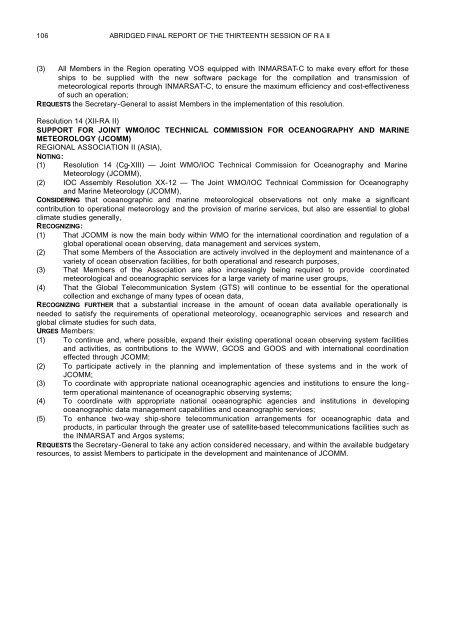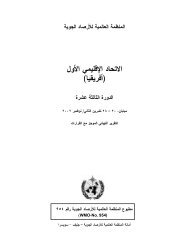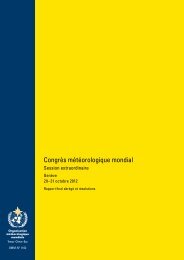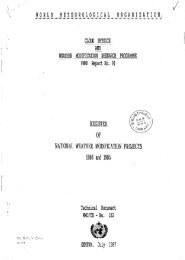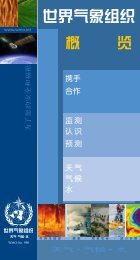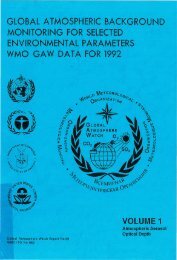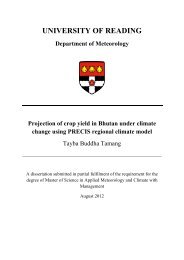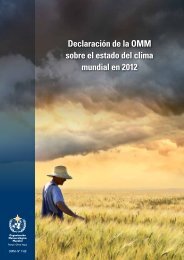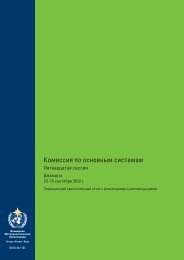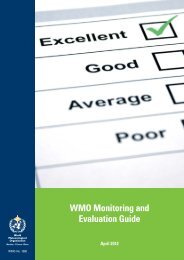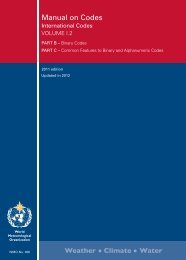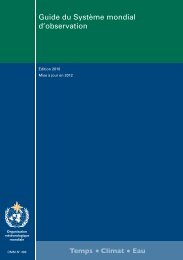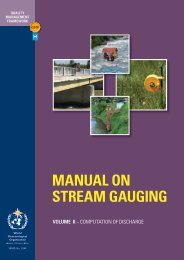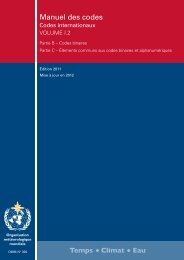RESOLUTIONS 105occur or are expected to occur, as well as on direction and speed of movement of significant pressuresystems;(3) To maintain close contact with users with a view to ensuring that the information issued keeps up withtheir requirements.Resolution 11 (V<strong>II</strong>-RA <strong>II</strong>)PROVISION OF MARINE METEOROLOGICAL SERVICES FOR COASTAL AND OFF-SHOREACTIVITIESTHE REGIONAL ASSOCIATION FOR <strong>ASIA</strong>,NOTING that coastal and off-shore activities such as coastal fisheries, shore mining operations, harbourdevelopment, coastal development and engineering works have been on the increase in recent years,CONSIDERING:(1) That the increasing coastal and off-shore activities call for corresponding expansion of marinemeteorological services for the safety and economy of these activities,(2) That the services should include, where necessary, information on storm surges, in addition to gale andstorm warnings and warnings on high waves,(3) That an adequate forecast service to coastal and off-shore areas would need the backing ofobservational data from these areas and that, in addition, these data would be helpful in building up thestatistics for studies on coastal climatology,(4) That application of satellite products to coastal and off-shore services has proved highly useful,URGES Members:(1) To provide marine meteorological services for coastal and off-shore areas, if such services do notalready exist and to develop the services to meet the specific requirements of the users, takingadvantage, where possible, of satellite products available;(2) To issue, where necessary, warnings on storm surges;(3) To give full consideration to increasing by all possible means the observations from coastal and offshoreareas by including in the observing programmes of coastal stations and off-shore platforms suchsea parameters as waves, sea-surface temperature, sea ice, ice accretion, etc. and by establishing databuoy stations.Resolution 12 (X-RA <strong>II</strong>)USE OF INMARSAT FOR THE COLLECTION OF SHIPS’ METEOROLOGICAL AND OCEANOGRAPHICREPORTSREGIONAL ASSOCIATION <strong>II</strong> (<strong>ASIA</strong>),NOTING:(1) Resolution 19 (Cg-XI) — The collection and dissemination of marine meteorological and oceanographicinformation using INMARSAT,(2) The operation of Coast Earth Stations (CES) of INMARSAT in Region <strong>II</strong>,(3) The equipping of an increased number of ships participating in the <strong>WMO</strong> Voluntary Observing Ships(VOS) scheme with Ship Earth Stations (SES) of INMARSAT, in particular with the INMARSAT-Cfacility,CONSIDERING:(1) The need to increase the number of ships’ meteorological and oceanographic reports from most of thesea areas of Region <strong>II</strong>,(2) The considerable improvements to be expected in the receipt of marine meteorological andoceanographic observations from ships at sea through the enhanced use of the INMARSAT system,(3) The cost-savings which will accrue to those Members collecting such reports through INMARSAT by theincreased use of the new INMARSAT-C facility for this purpose,RECOGNIZING WITH APPRECIATION that certain Members operating INMARSAT CES have already arrangedthrough their CES to accept ships’ meteorological and oceanographic reports that are of general value to allMembers of <strong>WMO</strong>,BEING CONCERNED, however, that these reports are at present concentrated on a limited subset of the CESalready in operation, and that problems continue to be related to the timely redistribution to the countriesclosest to the geographical origin of reports collected through INMARSAT,URGES:(1) Those Members in the Region operating CES to accept ships’ meteorological and oceanographicreports transmitted through their CES free of charge to ships;(2) All Members concerned to make every effort to ensure the timely redistribution of reports collectedthrough INMARSAT to countries in the areas of the geographical origins of those reports;
106 ABRIDGED FINAL REPORT OF THE THIRTEENTH SESSION OF R A <strong>II</strong>(3) All Members in the Region operating VOS equipped with INMARSAT-C to make every effort for theseships to be supplied with the new software package for the compilation and transmission ofmeteorological reports through INMARSAT-C, to ensure the maximum efficiency and cost-effectivenessof such an operation;REQUESTS the Secretary-General to assist Members in the implementation of this resolution.Resolution 14 (X<strong>II</strong>-RA <strong>II</strong>)SUPPORT FOR JOINT <strong>WMO</strong>/IOC TECHNICAL COMMISSION FOR OCEANOGRAPHY AND MARINEMETEOROLOGY (JCOMM)REGIONAL ASSOCIATION <strong>II</strong> (<strong>ASIA</strong>),NOTING:(1) Resolution 14 (Cg-X<strong>II</strong>I) — Joint <strong>WMO</strong>/IOC Technical Commission for Oceanography and MarineMeteorology (JCOMM),(2) IOC Assembly Resolution XX-12 — The Joint <strong>WMO</strong>/IOC Technical Commission for Oceanographyand Marine Meteorology (JCOMM),CONSIDERING that oceanographic and marine meteorological observations not only make a significantcontribution to operational meteorology and the provision of marine services, but also are essential to globalclimate studies generally,RECOGNIZING:(1) That JCOMM is now the main body within <strong>WMO</strong> for the international coordination and regulation of aglobal operational ocean observing, data management and services system,(2) That some Members of the <strong>Association</strong> are actively involved in the deployment and maintenance of avariety of ocean observation facilities, for both operational and research purposes,(3) That Members of the <strong>Association</strong> are also increasingly being required to provide coordinatedmeteorological and oceanographic services for a large variety of marine user groups,(4) That the Global Telecommunication System (GTS) will continue to be essential for the operationalcollection and exchange of many types of ocean data,RECOGNIZING FURTHER that a substantial increase in the amount of ocean data available operationally isneeded to satisfy the requirements of operational meteorology, oceanographic services and research andglobal climate studies for such data,URGES Members:(1) To continue and, where possible, expand their existing operational ocean observing system facilitiesand activities, as contributions to the WWW, GCOS and GOOS and with international coordinationeffected through JCOMM;(2) To participate actively in the planning and implementation of these systems and in the work ofJCOMM;(3) To coordinate with appropriate national oceanographic agencies and institutions to ensure the longtermoperational maintenance of oceanographic observing systems;(4) To coordinate with appropriate national oceanographic agencies and institutions in developingoceanographic data management capabilities and oceanographic services;(5) To enhance two-way ship-shore telecommunication arrangements for oceanographic data andproducts, in particular through the greater use of satellite-based telecommunications facilities such asthe INMARSAT and Argos systems;REQUESTS the Secretary-General to take any action considered necessary, and within the available budgetaryresources, to assist Members to participate in the development and maintenance of JCOMM.


